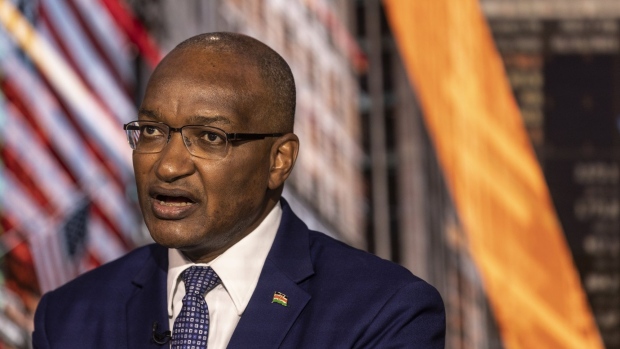Sep 29, 2022
Kenya Raises Key Interest Rate by 75 Basis Points to 8.25%
, Bloomberg News

(Bloomberg) -- Kenya’s central bank raised its benchmark interest rate by the biggest margin in more than seven years to anchor inflation expectations at its first policy meeting since newly-elected President William Ruto took power this month.
It increased the rate by 75 basis points to 8.25%, Governor Patrick Njoroge said in an emailed statement Thursday. That’s the second hike this year and the steepest since July 2015. The median estimate of seven economists in a Bloomberg survey was for an increase of 50 basis points.
The monetary policy committee decided the move because of sustained inflationary pressures and the impact elevated global risks may have on the domestic economy, Njoroge said.
The removal of price support measures this month have led to an increase in fuel and electricity costs, the governor said. Kenya scrapped a subsidy on gasoline and corn flour and plans to drop those for diesel and kerosene by year-end.
Ruto has vowed to tackle the high cost of living by shifting subsidies to farming inputs, rather than directly cushioning consumers.
Kenya’s MPC joins the US Federal Reserve, European Central Bank and South African Reserve Bank in hiking by three-quarters of a percentage point this month in an escalating assault on surging prices.
Inflation accelerated for a sixth successive month in August to 8.5% and has been above the Central Bank of Kenya’s 7.5% ceiling since June -- a level last seen in 2017 when a severe drought drove up the cost of food.
Other Highlights:
- The economy is expected to remain resilient for the rest of 2022, supported by the services sector despite subdued performance in agriculture and weaker global growth.
- Surveys conducted by the central bank revealed optimism about business activity and economic-growth prospects for this year due to renewed investor confidence after the Aug. 9 elections and anticipated new government policies.
- Private-sector credit grew by 12.5% in August from 12.3% in June.
- Ratio of gross non-performing loans to gross loans stood at 14.2% in August compared with 14.7% in June.
- Foreign-exchange reserves fell to $7.4 billion in September from $7.7 billion in July, equivalent to 4.18 months of import cover.
(Updates with Ruto’s plan to tackle high cost of living in paragraph five)
©2022 Bloomberg L.P.






